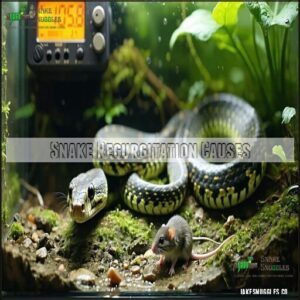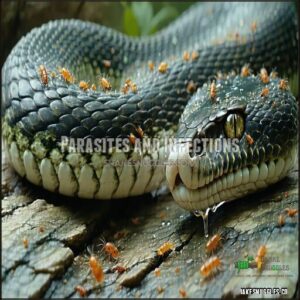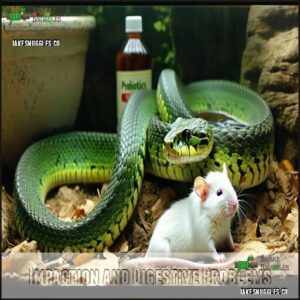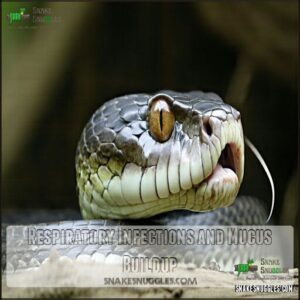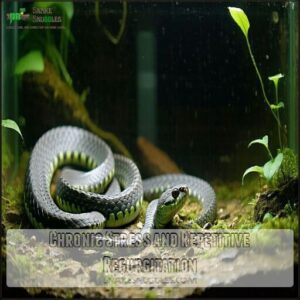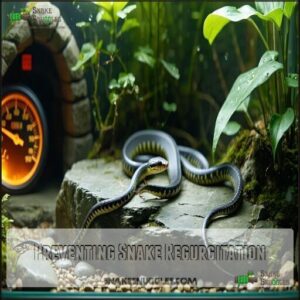This site is supported by our readers. We may earn a commission, at no cost to you, if you purchase through links.

Stress, like frequent handling or sudden environment changes, can interfere with digestion. If the enclosure’s temperature is too low, your snake can’t properly digest its meal, leading to regurgitation.
Feeding prey that’s too large or spoiled can also upset its stomach. Sometimes, it’s a health issue, like parasites, infections, or impaction, causing trouble.
Think of it as your snake’s way of saying something’s not right. Addressing these causes can help prevent regurgitation and keep your snake healthy. Curious about prevention? Stay tuned.
Table Of Contents
- Key Takeaways
- Snake Regurgitation Causes
- What Causes Snake Regurgitation
- Environmental Stress Factors
- Health Issues and Regurgitation
- Preventing Snake Regurgitation
- Frequently Asked Questions (FAQs)
- Why does a snake regurgitate its food?
- What does regurgitation mean in snakes?
- Can a snake regurgitate a meal?
- What should I do if my snake regurgitates?
- What if a snake is vomiting or regurgitating?
- Why does my snake vomit a lot?
- Why would a snake regurgitate?
- What is the difference between vomiting and regurgitation in snakes?
- What to do if my ball python regurgitates?
- Can dehydration contribute to snake regurgitation?
- Conclusion
Key Takeaways
- Don’t handle your snake for at least 48 hours after feeding to avoid stress that can disrupt digestion and cause regurgitation.
- Maintain proper temperatures and a thermal gradient in the enclosure to support effective digestion and prevent food from spoiling inside your snake.
- Feed prey that’s appropriately sized—no larger than 1.5 times your snake’s widest part—to prevent digestive issues and regurgitation.
- Always monitor for health problems like parasites or infections, and consult a vet if regurgitation persists or occurs frequently.
Snake Regurgitation Causes
When your snake regurgitates, it’s often a sign that something in its environment or care isn’t quite right.
From stress and temperature issues to improper feeding or health problems, understanding the causes can help you prevent it, by addressing the root causes.
Stress and Environmental Changes
Stressful environments can quickly lead to snake regurgitation.
Stressful environments disrupt digestion, making regurgitation likely—prioritize calming spaces and secure enclosures for healthier, happier snakes.
Sudden environmental changes, poor enclosure security, or frequent handling elevate stress levels, disrupting digestion.
To help:
- Reduce noise and maintain a calm space.
- Limit handling frequency, especially after feeding.
- Provide environmental enrichment like secure hides and stable lighting to mimic natural conditions.
A low-stress environment guarantees healthier digestion and happier snakes.
Temperature Imbalances and Digestion
When snakes experience temperature imbalances, digestion gets disrupted, leading to regurgitation.
Low environmental temperatures slow digestion, allowing food to rot inside. Maintaining an ideal temperature range with a proper heat gradient is essential.
Basking importance can’t be overstated—snakes rely on thermoregulation to process food efficiently. Incorrect temperature settings often mean trouble, so always double-check your enclosure’s setup to ensure proper heat gradient and avoid issues related to temperature imbalances.
Oversized or Spoiled Prey
Feeding issues like oversized or spoiled prey often lead to regurgitation.
Follow these steps to prevent problems:
- Choose prey size no larger than the snake’s widest point.
- Prioritize proper prey gut-loading and thawing practices for better prey quality.
- Store prey correctly to avoid foodborne illnesses.
- Stick to a consistent feeding frequency, giving the snake time to digest comfortably, which helps prevent feeding issues.
Underlying Health Issues
Sometimes regurgitation stems from underlying health issues like parasites, fungal infections, viral diseases, or digestive impaction.
These snake health problems disrupt digestion and often require veterinary intervention.
Unlike oversized or spoiled prey, hidden illnesses demand parasite identification and treatment to stop recurring symptoms.
Ignoring these snake regurgitation causes can worsen infections, making prompt care critical for restoring proper digestion and overall health.
What Causes Snake Regurgitation
Snake regurgitation happens when undigested food is expelled due to stress, improper temperatures, or health issues. Understanding these triggers helps you provide a healthier, more stable environment for your snake.
Importance Of Effective Communication
Understanding snake regurgitation causes starts with clear messaging.
Miscommunication in snake care, like unclear handling guidelines or misunderstood instructions, leads to snake stress factors. Active listening when learning snake handling techniques prevents mistakes like feeding issues or improper care.
Building trust by following proper protocols and ensuring strong team collaboration with other keepers promotes healthier, stress-free snakes in enriched environments.
Challenges In Modern Communication
With the ever-growing reliance on technology, modern communication faces unique challenges that can rival the nuances of snake care.
These include:
- Digital Overload: Too much information leads to decision fatigue.
- Misinformation Spread: Inaccurate advice worsens snake regurgitation causes.
- Virtual Fatigue: Constant online access overwhelms snake keepers.
- Generational Differences: Diverse tech familiarity impacts advice-sharing.
- Global Accessibility: Uneven resources hinder consistent care standards.
Tools For Streamlined Messaging
When discussing snake regurgitation causes, it may seem odd to compare husbandry practices to modern messaging platforms, but think about it—streamlined tools reduce errors.
Automation features keep routines consistent, team collaboration enhances care, and security protocols guarantee safe environments.
Integration options mimic effective feeding schedules, tackling issues like stress, prey size mistakes, incorrect husbandry, and underlying health issues, which can be addressed through automation features and security protocols.
Environmental Stress Factors
Stressful environments can cause your snake to feel unsafe, leading to regurgitation as a natural response.
Factors like inadequate hiding spots, poor temperature control, and excessive disturbances all contribute to this issue.
Inadequate Hiding Spots and Enclosure Size
Inadequate hides can leave snakes feeling stressed, triggering behavioral impacts like regurgitation.
Proper enclosure setup means offering secure hiding spots on warm and cool sides to promote comfort and stress reduction.
Your snake’s enclosure security and space requirements matter—too-small spaces or overcrowding create environmental stressors, harming digestion.
Consider appropriate enclosure dimensions to prevent stress-induced regurgitation.
Fixing hiding benefits guarantees a healthier, calmer snake without digestive mishaps.
Improper Temperature Gradients and Humidity
Temperature gradients and humidity play a big role in a snake’s health. Improper temperatures or low humidity levels can create environmental stressors, slowing digestion and causing shedding issues.
Maintaining proper temperatures may require a reptile heat source.
To maintain a balanced thermal gradient and prevent stress, consider the following:
- Make certain basking spots are warm enough.
- Keep humidity levels suited for the species.
- Design enclosures for ideal airflow.
- Avoid abrupt temperature fluctuations.
Handling and Feeding Techniques
Handling techniques substantially impact snake regurgitation.
Avoid handling your snake for at least 48 hours post-feeding, as this reduces stress and digestion disruption.
Feeding techniques matter too—feed prey no larger than 1.5 times the snake’s widest part.
Use proper thawing methods for frozen prey and skip live feeding when possible to avoid injuries.
Prey gut-loading guarantees a healthy meal.
Employing effective snake feeding techniques can further minimize stress and support healthy snake care.
Noise and Disturbances
Snakes are sensitive to noise and vibrations, so a calm space is essential.
Loud noises and vibrations (Auditory Stressors and Vibration Effects) can cause unsettling stress, leading to snake regurgitation.
To reduce environmental stress:
- Place the enclosure away from noisy areas and foot traffic (Enclosure Placement).
- Minimize handling frequency.
- Avoid visual disturbances from constant activity or bright lights to create a more stable environment and reduce the risk of snake regurgitation.
Health Issues and Regurgitation
Health problems like parasites, infections, and digestive blockages can make your snake regurgitate its meals.
Identifying these issues early and consulting a veterinarian are essential to keeping your snake healthy and stress-free.
Parasites and Infections
Parasites and infections in snakes, like Cryptosporidium and other protozoal parasites, can wreak havoc on digestion, leading to regurgitation.
Cryptosporidium parasites can severely disrupt digestion, highlighting the importance of early detection to prevent snake regurgitation and maintain health.
Bacterial overgrowth or fungal infections worsen the problem.
Internal parasites cause inflammation, weaken the snake, and disrupt nutrient absorption.
Regular veterinary diagnosis is key to spotting parasitic infection snakes early, ensuring prompt care and preventing further stress on your pet’s health.
Impaction and Digestive Problems
Impaction and other digestive issues can cause serious snake digestion problems.
Gut blockages often result from eating substrate or oversized prey. Regular fecal analysis helps monitor the gut microbiome and catch digestive disorders early.
Hydration is key—dehydrated snakes are more prone to impaction.
Probiotics benefits and enema use can aid recovery, ensuring proper gut health and resolving digestive problems efficiently.
Respiratory Infections and Mucus Buildup
Respiratory infections in snakes can lead to mucus buildup, making breathing difficult and often triggering regurgitation.
A bacterial infection increases mucus viscosity, disrupting digestion. Antibiotic treatment depends on infection severity, but catching signs like wheezing or bubbles early is vital.
Recognizing signs of respiratory issues early can be life saving. Preventative measures, including maintaining ideal humidity and hygiene, help avoid these underlying health issues and safeguard your snake’s health from recurring snake regurgitation.
Chronic Stress and Repetitive Regurgitation
Handling stress and poor husbandry substantially impact a snake’s well-being, with chronic stress being a key stress trigger for regurgitation in snakes.
Behavioral changes, like frequent hiding or lethargy, signal stress responses.
Long-term effects, such as repetitive regurgitation, weaken digestion, and preventative measures—like creating a calm, quiet habitat—reduce stress and guarantee proper digestion, avoiding long-term health problems for your pet, which can be triggered by poor husbandry.
Preventing Snake Regurgitation
Preventing snake regurgitation starts with creating the right environment and following proper care practices.
By maintaining stable temperatures, minimizing stress, and feeding correctly sized prey, you’ll help your snake stay healthy and comfortable.
Maintaining Proper Thermal Gradients
Every snake needs a well-maintained thermal gradient to digest properly.
Set up basking spot temps at the ideal temperature range while ensuring a cool zone for regulation. Use thermostats for calibration and gradient monitoring tools to prevent improper temperatures.
Choose reliable heat source types and check regularly. A key component is the correct basking bulb.
Without proper temperatures, digestion slows, leading to discomfort and possible regurgitation, which can be prevented with a properly set up basking spot.
Providing Stress-Free Environments
A stress-free environment keeps your snake healthy and prevents regurgitation.
Focus on enclosure enrichment by adding hides, ensuring hiding adequacy for security.
Reduce handling stress with gentle, proper handling techniques, and wait after feeding.
Minimize noise and disturbances around the enclosure.
A quiet environment with stable conditions creates a secure environment, reducing stress and supporting digestion effectively.
Feeding Appropriately Sized Prey
A stress-free environment builds trust, but feeding appropriately sized prey helps digestion run smoothly.
Oversized prey or improper prey selection causes stress, regurgitation, and potential harm.
- Match prey size to your snake’s widest body part.
- Avoid overfeeding risks by setting consistent feeding frequency.
- Steer clear of undersized prey, as it lacks proper prey nutritional value.
- Always feed appropriate prey, not oversized prey, to ensure a smooth digestion process and prevent regurgitation.
Regular Veterinary Checkups and Health Monitoring
Building on proper feeding practices, regular veterinary checkups are your snake’s best defense against regurgitation.
A reptile vet can spot issues like parasites or weight trends early, and health monitoring guarantees preventative care and timely intervention, keeping snake health at its best.
Regular checkups also allow vets to offer guidance on proper enclosure setup, which is crucial for preventing regurgitation and ensuring the overall well-being of your snake.
Parasite detection, tracking health trends, and early action minimize risks in digestion, making snake regurgitation preventable with the right care, and emphasizing the importance of regular checkups.
Frequently Asked Questions (FAQs)
Why does a snake regurgitate its food?
Your snake regurgitates food when it’s stressed, too cold to digest properly, or given prey that’s too large.
Digestive health issues, improper husbandry, or handling after feeding can also disrupt its delicate system.
What does regurgitation mean in snakes?
Regurgitation in snakes means they bring up undigested food from their stomach through their mouth.
This often happens due to stress, improper handling, or environmental factors disrupting digestion, like incorrect temperatures or feeding issues.
Can a snake regurgitate a meal?
Imagine carrying a heavy backpack too big for you—your snake feels something similar with an oversized meal or stress.
Yes, a snake can regurgitate its food, especially if conditions aren’t ideal for digestion.
What should I do if my snake regurgitates?
If your snake regurgitates, clean the enclosure immediately to prevent bacteria, and avoid feeding for 7–10 days.
Make certain proper temperatures and minimal stress, then reintroduce smaller prey.
Consult a vet if regurgitation persists.
What if a snake is vomiting or regurgitating?
Like a red flag waving, regurgitation or vomiting signals something’s wrong.
Check your snake’s environment, prey size, and stress levels.
Verify proper heat and handling practices, and consult a vet if problems persist.
Why does my snake vomit a lot?
Frequent vomiting could mean your snake’s stressed, dealing with improper temperatures, or eating prey that’s too big.
It might also signal health issues like parasites or infections, so a vet check-up is essential.
Why would a snake regurgitate?
A snake’s regurgitation is like hitting rewind on a bad meal.
It’s often triggered by stress, improper temperatures, oversized prey, or handling too soon after feeding.
Addressing these issues guarantees smoother digestion and healthier snakes.
What is the difference between vomiting and regurgitation in snakes?
Vomiting is forceful and expels partially digested food mixed with fluids, signaling serious health issues.
Regurgitation is passive, occurs soon after feeding, and expels undigested food intact, often due to stress or environmental factors.
What to do if my ball python regurgitates?
Regurgitation requires rest, reassurance, and readiness.
Don’t feed again for two weeks, clean the enclosure thoroughly, and check temperatures.
Avoid handling during this period. If it happens repeatedly, consult a herp vet to guarantee their health.
Can dehydration contribute to snake regurgitation?
Yes, dehydration can contribute to regurgitation by affecting digestion and overall health.
Without enough hydration, your snake’s digestive system struggles, increasing the risk of expelling food.
Always make certain fresh water is easily accessible, as this is crucial for preventing dehydration.
Conclusion
Just like a red flag signals danger, snake regurgitation often highlights an issue that needs your immediate attention.
Understanding what causes snake regurgitation, from stress and temperature imbalances to oversized prey or health concerns, is essential for maintaining your pet’s well-being.
By optimizing their environment, ensuring proper feeding practices, and addressing potential health issues promptly, you’ll create a safe and stress-free habitat.
Pay attention to these signs—it’s your snake’s way of communicating its needs, and prevention is key!

